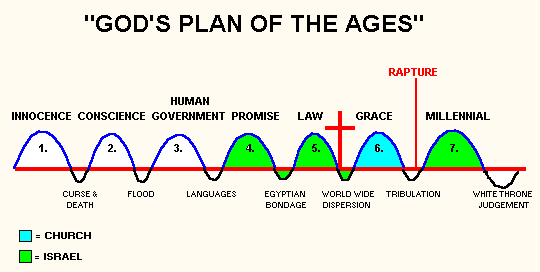
The Dispensational view is of recent origin, arising from the evangelical awakening in America and England. Through the work of Jesse Penn-Lewis, T. Austin Sparks, J. N. Darby (who is given credit for formally bringing the view to light), Dwight Moody, C. I. Scofield (who included it in the Scofield Bible), Watchman Nee, Lewis Sperry Chafer, John Walvoord, and Hal Lindsey, this view has become widespread and popular today. It is the view of most Pentecostals, Brethren, many Baptists, and most independent Bible churches.
Dispensations (Greek: oikonomia) refer to economies, or different ways in which God works with man in salvation history (see: Eph. 1:10; 3:2; 1 Tim. 1:4). In the classic Dispensational scheme, each dispensation begins with a (a.) responsibility for man by God and (b.) ends with failure by man and a period of divine judgment. God is the same yesterday, today and tomorrow, yet dispensational theology tends to emphasize the diversity of ways in which God works with mankind. See the chart below:

What is it (ultradispensationalism)? Can't say I know that term. Heard of it, yes. Know what it is? No. I've never studied it. How does it fit with pre-wrath?
F.
Ultradispensationalism basically states that the church, as the body of Christ, began in Acts 13 when Paul turns from the Jews to preaching the gospel to the Gentiles, rather than the traditional view that the church began at Pentecost in Acts 2. The "Berean Bible Society" (for info on BBS see my "links" page and "resource center") primarily espouses this view. This is probably the more correct biblical view. Also, see: The Church: Body or Bride?.
"Extreme" ultradispensationalism (so named by Charles Ryrie) states that the church, as the body of Christ, began at the end of Acts (see Acts 28:17-29) when the Jewish leaders completely rejected Paul's teaching. This is also about the time when Paul introduces the "great mystery" (Eph. 5:32) which is a new creature (creation), which is the body of Christ--where there is neither Jew nor Greek (Gentile), but all are identified "in Christ" as His body in Paul's letter to the Ephesians. E.W. Bullinger first introduced this view. There is indeed much to be said about this view.
There are two "churches" and two programs God has with both of the ultradispensational teachings. Remember "church" simple means assembly and there is nothing spiritual about the term in and of itself--its the traditional connotations that are put on it that has prejudiced the body of Christ as to its truer meaning (identity). Israel is a church. They were a church in the desert and when they conquered Caanan--a great assembly of God. The promises from God were given them as a "church" that they would be priests and bring the gospel to the Gentiles (a light unto the Gentiles, i.e., nations), but they failed by rejecting their Messiah--Jesus. First, God turned to the Gentiles to provoke jealousy with the Jews, but still they continued to reject Him. So God finally introduces His "mystery" plan, "hidden" in the OT. This mystery is the "new creation"--the "body of Christ." This "church" now is not the same as Israel--is it? It also involves a separate program than the one for Israel. Therefore, there are two "churches," Israel (from God's promise to Abraham--to make a great nation; i.e., a great assembly) and God's new creation--the body of Christ, previously a mystery. And, God has a different program for each of these two "churches." "Displacement" theology is still largely taught and in part within the body of Christ's thinking--too much is taken from Israel and wrongly applied to the body of Christ. What ultradispensationalism attempts to do is to discern and distinguish God's separate programs--what truly belongs to Israel as the (a) church and what truly is the church's as the body of Christ. I trust this makes everything clear!
BTW the pre-wrath view is not affected by which dispensational view one believes--but I do agree that it comes into better focus if one has the correct view.
One more thing, the opposing view to all the dispensational views is "covenant theology." That's a whole other topic.
Ralph